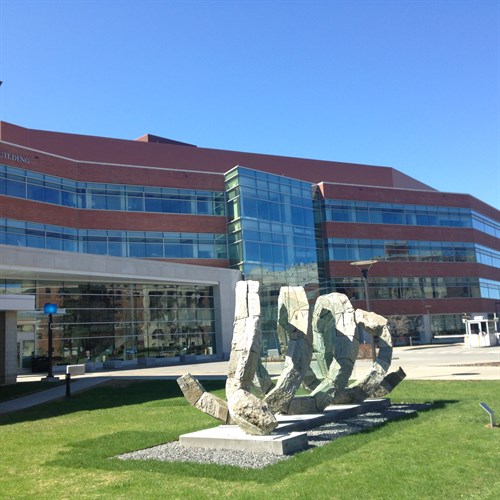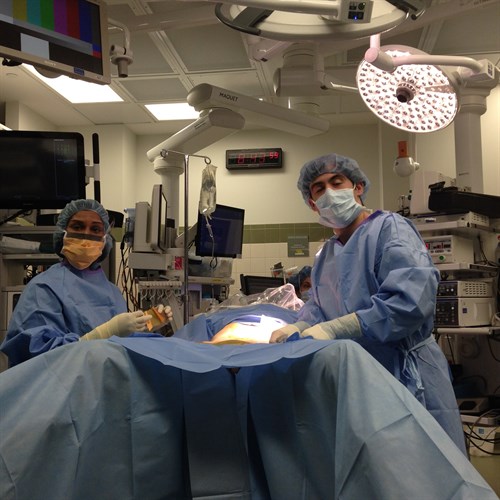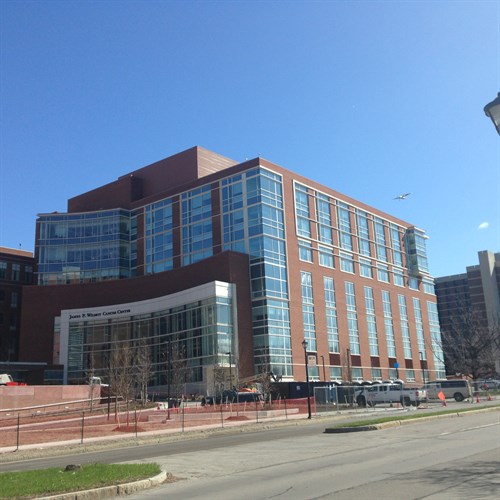Julie Cornish's Ronald Raven Fellowship-Travelling Report 2014
Report and photos of Raven Fellow Julie Cornish's visit to Strong Memorial Hospital, Rochester, New York State
Julie Cornish is currently a Senior Colorectal Fellow (pelvic
floor) in Oxford University Hospital Trust. She has a strong
academic interest, particularly in functional outcomes following
surgery. She went to medical school in Cardiff, University Hospital
of Wales, going onto general surgical training and gained an MD
from Imperial College, London in 2011, under the supervision of
Professor Paris Tekkis. Her MD Thesis on "Inflammatory bowel
disease and female reproductive health" focused on the impact of
IBD on functional outcomes and quality of life in women following
restorative proctocolectomy. She set up the Welsh Barbers
Research Group in 2009 as the surgical trainee collaborative in
Wales (www.welshbarbers.org.uk). As part of the WBRG, she also
established the HART trial development group. HART (Hughes
Abdominal Repair Trial) is a multicentre NIHR funded RCT designed
to assess the incidence of incisional hernias in patients with a
midline incision for colorectal cancer surgery in two different
arms; mass closure and the Hughes repair (a modified mattress
suture).

I was awarded the Ronald Raven Travelling Fellowship in 2014 and
was fortunate to be able to use this towards funding a two week
observership at University of Rochester Medical Center Complex
(URMC), in Strong Memorial Hospital's Colorectal Department with
Professor John Monson. Strong Memorial Hospital is a large modern
medical facility with 830 beds.
Professor Monson was originally appointed as a colorectal
consultant in Hull and came to URMC as a visiting professor. He
then stayed on to become Chief of URMC's Division of Colorectal
Surgery and Vice Chair of its Department of Surgery in 2008.
His experience of both the U.K and the U.S. healthcare system
has allowed him to see the merits and flaws in both systems, which
has led to an interest in outcomes in surgical care. He is also a
leader in the field of low rectal cancer and part of the OSTRiCh
Consortium (Optimizing the Surgical Treatment of Rectal Cancer) to
improve the quality of care for rectal cancer in the U.S.
Day one in the department of surgery started with a 7am Quality
Improvement meeting, which was attended by a large number of
surgeons and trainees. Very different to the attendance of a
typical UK 8am departmental meeting! I was struck by the
genuine interest by all staff in the QI programs that had been
initiated and how they had impacted not only on cost but also on
patient care. Even the most junior of trainees understood the
requirement to produce high level care with service efficiency and
cost effectiveness.

During the two weeks I attended theatres regularly, watching
robotic and advanced laparoscopic cases. I saw a relatively new
insufflation device (AirSeal) for the transanal total mesorectal
excision. In combination with the Gelport the approach seemed to
reduce many of the issues that have been reported with transanal
TME, with minimal billowing and good views. There were more than 30
theatres and several robots in use, mostly by gynaecologists and
urologists.
The majority of the cases were anaesthetised by a nurse
anaesthetist. This requires a 4 year nurse training degree,
followed by at least one year in ITU, then a very competitive entry
onto a 24 month course which costs them around $50K to do. The
nurse anaesthetists do most lists independently except obstetrics,
cardiac, vascular and transplant. Interestingly the general
feeling from the surgeons was they preferred this to the doctor
anaesthetists! I asked the anaesthetic trainees how they felt about
it and they were not unhappy with it as the nurse anaesthetists
acted to provide gaps in the service rota not covered by
trainees.
During one of the outpatient clinics I met a patient who had had
driven for more than 8 hours to be treated at Strong Memorial.
She explained that her local surgeon had kept cancelling
appointments and didn't talk to her. The surgeon at Rochester had
taken the time to explain the procedure to her and didn't mind
answering any questions she had. As her husband put it "Its
simple really, it's about people skills. If you don't treat people
as people they aren't going to trust you, even if you are the best
technical surgeon in the world."
That's one thing I did notice about the culture in the hospital;
from the posters on the wall to the smiling faces of the
receptionists, the hospital gave off an atmosphere of
approachability and being patient focused.
During outpatient clinics I attended there was a significant
difference to the UK, with more discussion about mood, family and
outcomes since discharge. This is probably due to the longer time
slots, with clinician consultations lasting between 40-60 minutes
per patient. One aspect that I really liked was the lounge
area for patients and relatives, which was located close to
theatre. Relatives were encouraged to attend with patients. There
was airport lounge style board updating on patients location and
progress through the process and clinicians would go and speak to
the relatives immediately following surgery to speak to their
family and reassure or update them on their condition.
All of the departments had their own weekly grand round and the
surgical update was on the use of medical marihuana, entitled
"Drugs, sex and rock and roll". This 7am morning lecture was
attended by nearly 60 juniors and consultants. Professor Gary
Morrow gave an interesting lecture, although it's not something I
intend on trying to instigate back home. Additional talks from the
pharmacy and physiotherapy departments gave useful insights into
local policies and opportunities for collaboration between
departments.
The department of surgery also has the SHORE research facility
linked on site. SHORE (Surgical Health Outcomes &
Research Enterprise) aims to identify the most effective ways to
organize, manage, finance, and deliver high quality care as well as
reduce medical errors, control costs, and improve patient safety.
SHORE is an excellent unit that has several surgical research
fellows, as well as researchers from public health, IT and
biostatistics who work in collaboration. Professor Monson and
Dr Fergal Fleming act as clinical leaders for SHORE with Dr Katia
Noyes acting as the scientific director of the unit. I was
impressed with the training programs for the surgeons and enjoyed
seeing the benefits of the collaboration to look at projects from a
variety of viewpoints. I have instigated some joint research
projects with the unit which I hope will lead to future
collaboration. I would like to thank Professor Monson and the
team in URMC for their kindness in making me feel welcome, showing
me around and giving advice on where to go.

Special thanks to Carmella Re, Professor Monson's secretary, for
organizing my schedule and finding me when I got lost and to Dr
Fergal Fleming and his wife Natasha who were especially generous
with their time and hospitality.I would also like to thank the
British Association of Oncology for their generosity, without whom
I would not have visited this amazing hospital and seen the "other
side of the mirror" for healthcare.